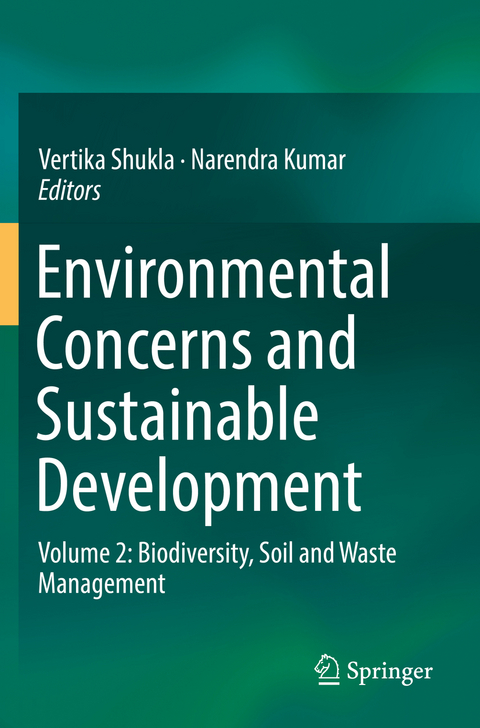
Environmental Concerns and Sustainable Development
Springer Verlag, Singapore
978-981-13-6360-3 (ISBN)
In order to ensure sustainable development, the highest-priority issues include the monitoring and eradication of environmental problems stemming from economic development; virtually every form of economic development primarily results in the loss of forests and thus biodiversity, followed by declining air quality and the contamination of natural resources.
Sustainable development ensures responsible interactions with the environment, so as to minimize the depletion or degradation of natural resources and preserve environmental quality. It involves integrated approaches to understanding the importance of environmental management systems and policy measures that lead to improved environmental performance.
This book addresses the environmental concerns associated with economic development, and with approaches to attaining sustainable economic development, which include monitoring the quality of water resources, soil erosion and degradation of the natural environment.
Vertika Shukla holds an MSc in Organic Chemistry and PhD (2003) in Chemistry from H.N.B. Garhwal University, Srinagar (Garhwal). Presently, she is teaching as an Assistant Professor of Integrated Applied Geology at Babasaheb Bhimrao Ambedkar (Central) University, Lucknow. During her 17 years of research experience, she has been awarded 3 fellowships by the DST, New Delhi; two projects were pursued at the NBRI-CSIR and one at BBA (Central) University, Lucknow. To date, she has published 63 scientific articles in prominent national and international journals, has authored one book (‘Lichens to Biomonitor the Environment’ (Springer)) and coedited the books ‘Recent Advances in Lichenology (Springer) and ‘Plant Adaptation Strategies in Changing Environment’ (Springer Nature). Her areas of interest include secondary metabolite chemistry, interactions between lichen and the environment, and the roleof lichen in the bioremediation of atmospheric fallouts. Narendra Kumar has obtained his MSc and PhD in Environmental Science from Babasaheb Bhimrao Ambedkar (Central) University, Lucknow, India. An active researcher with 16 years of graduate teaching and research experience, Dr Kumar began his academic career as a project fellow at the National Botanical Research Institute (NBRI-CSIR), Lucknow, India. In 2002, he joined the Department of Environmental Science, Institute of Bioscience and Biotechnology, CSJM University, Kanpur, India as a Lecturer. Dr Kumar has been working as an Assistant Professor at Babasaheb Bhimrao Ambedkar University, Lucknow since 2005. He has published more than 30 research papers and 10 book chapters with reputed national and international publishers.
Chapter 1: Threats and conservation strategies for overlooked organisms: the case of epiphytic lichens.- Chapter 2: Biodiversity and Therapeutic Potential of Medicinal Plants.- Chapter 3: Tree ferns and giant ferns in India: Significance and Conservation.- Chapter 4: Status of medicinal plants in context of Arunachal Pradesh, India.- Chapter 5: Nutrient Enrichment in Lake Ecosystem and its Effects on Algae and Macrophytes.- Chapter 6: Land-use change as a disturbance regime.- Chapter 7: Floristic diversity, distribution and conservation status in the vicinity of coal mines of Kachchh district in Gujarat, India.- Chapter 8: Sodic Soil: Management and reclamation Strategies.- Chapter 9: Microbe based inoculants: role in next green revolution.- Chapter 10: Environmental Significance of Lichens and Biodeterioration.- Chapter 11: Soil reclamation of saline and sodic soil through phytoremediation.- Chapter 12: Soil pollution by Fluoride in India: Distribution, Chemistry and analytical methods.- Chapter 13: Multielement analysis using ED-XRF and ICP-MS from Couroupita guianensis for sustainable agriculture by soil reclamation.- Chapter 14: Waste Management: A Paradigm Shift.- Chapter 15: Recycling of agriculture waste into efficient adsorbent.- Chapter 16: Environmental hazards and management of e-waste.- Chapter 17: Green House Gas Emissions from Municipal Solid Waste Management Practice.- Chapter 18: Introduction to fast fashion: Environmental Concerns and Sustainability Measurements
| Erscheinungsdatum | 07.07.2020 |
|---|---|
| Zusatzinfo | 36 Illustrations, color; 40 Illustrations, black and white; XIV, 427 p. 76 illus., 36 illus. in color. |
| Verlagsort | Singapore |
| Sprache | englisch |
| Maße | 155 x 235 mm |
| Themenwelt | Naturwissenschaften ► Biologie ► Ökologie / Naturschutz |
| Naturwissenschaften ► Geowissenschaften ► Geologie | |
| Technik | |
| Weitere Fachgebiete ► Land- / Forstwirtschaft / Fischerei | |
| Schlagworte | air quality • Biodiversity conservation • Soil Reclamation • waste management • water resources |
| ISBN-10 | 981-13-6360-9 / 9811363609 |
| ISBN-13 | 978-981-13-6360-3 / 9789811363603 |
| Zustand | Neuware |
| Haben Sie eine Frage zum Produkt? |
aus dem Bereich


